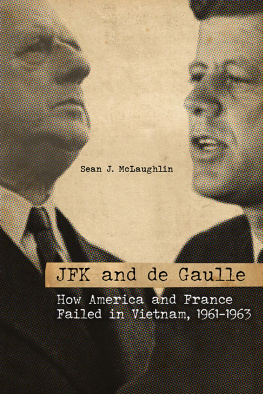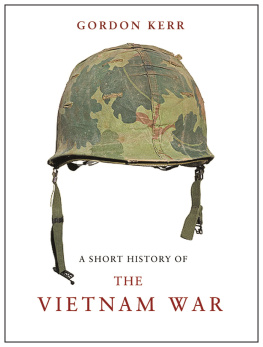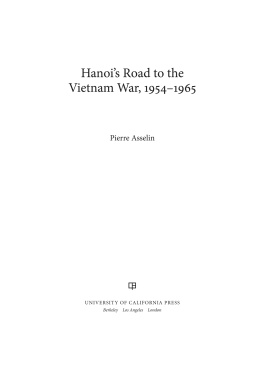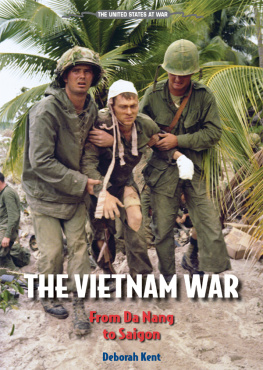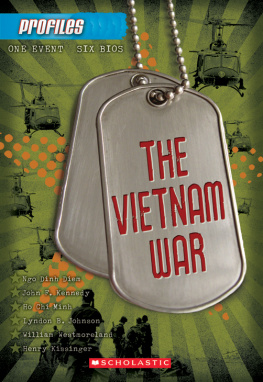
JFK and de Gaulle
JFK and de Gaulle
How America and France Failed in Vietnam, 1961-1963
Sean J. McLaughlin

Due to variations in the technical specifications of different electronic reading devices, some elements of this ebook may not appear as they do in the print edition. Readers are encouraged to experiment with user settings for optimum results.
Copyright 2019 by The University Press of Kentucky
Scholarly publisher for the Commonwealth,
serving Bellarmine University, Berea College, Centre
College of Kentucky, Eastern Kentucky University,
The Filson Historical Society, Georgetown College,
Kentucky Historical Society, Kentucky State University,
Morehead State University, Murray State University,
Northern Kentucky University, Transylvania University,
University of Kentucky, University of Louisville,
and Western Kentucky University.
All rights reserved.
Editorial and Sales Offices: The University Press of Kentucky
663 South Limestone Street, Lexington, Kentucky 405084008
www.kentuckypress.com
Library of Congress Cataloging-in-Publication Data
Names: McLaughlin, Sean J., 1978 author.
Title: JFK and de Gaulle : how America and France failed in Vietnam, 19611963 / Sean J. McLaughlin.
Description: Lexington : University Press of Kentucky, [2019] | Series: Studies in conflict, diplomacy, and peace | Includes bibliographical references and index.
Identifiers: LCCN 2019014999| ISBN 9780813177748 (hardcover : alk. paper) | ISBN 9780813177762 (pdf) | ISBN 9780813177779 (epub)
Subjects: LCSH: Kennedy, John F. (John Fitzgerald), 19171963. | Gaulle, Charles de, 18901970. | Vietnam War, 19611975United States. | United StatesForeign relationsFrance. | FranceForeign relationsUnited States. | United StatesForeign relations19531961. | United States--Foreign relations19611963.
Classification: LCC DS558 .M425 2019 | DDC 959.704/32dc23
This book is printed on acid-free paper meeting the requirements of the American National Standard for Permanence in Paper for Printed Library Materials.
Manufactured in the United States of America
| Member of the Association
of University Presses |
To Selina, Olivia, and the hope of a more peaceful American future.
Contents
Introduction
At the end of January 1963, Frances long-tenured ambassador to the United States, Herv Alphand, reported back to Paris on a top secret American exercise at Camp David that laid bare many of the stark differences between the two NATO allies. As Alphand noted to French foreign minister Maurice Couve de Murville, his old colleague from the Free French days of World War II, the Kennedy administration had decided the previous October (either before, during, or after the Cuban Missile Crisishe does not specify) to include representatives from Britain, France, and West Germany in a three-day series of politico-military simulations of potential conflict scenarios in divided Berlin. During the Cuban Missile Crisis, French president Charles de Gaulle had barely concealed his frustration from former Secretary of State Dean Acheson when he discovered that the Kennedy administration had no intention of coordinating strategy with the NATO allies it could have plunged into nuclear war. This may have convinced the White House to pull back the veil and show Washingtons closest allies how its planning culture operated.1 Never before had foreigners been invited into this world of roleplaying simulations, an elaborate process based on advanced math and probability calculations, that involved the most powerful men in the Kennedy administration and even on occasion the president himself as participants.2
A French team took part in a series of simulations from November 23 to 25, 1962, that were organized by the Rand Corporation and the Pentagon. Specialists and scientists had been working on the simulations for years. There were three different sorts of exercises, strategic, limited conflict, and politicomilitary, and the Ambassadors Group participants were divided according to the Kriegsspiel method into red, blue, and control teams. The American hosts created a comfortable environment to promote deep concentration, while the players were equipped with advanced technology, such as teleprinters, to facilitate rapid communication between teams. As the game began, players were expected to be, as Alphand described, pragmatic and analytical without any preconceived notions.3 Each participant would be afforded an opportunity to speak his mind on his own component of the game along with general matters that could extend beyond his specific area of professional expertise. He wrote, In doing so, the subject is exhausted by systematic research on every possible situation, and with repetition State Department and Pentagon functionaries came to acquire theoretical understanding and practice that was almost unimaginable. Alphand was deeply impressed by the sheer planning and intellectual energy that went into this undertaking, but he could not withhold comment on what he saw as its glaring shortcomings.
As hypermodern and technologically advanced as it appeared on the surface, the Kennedy administrations style of contingency planning was to the French mind tedious and useless. These exercises stressed summaries of military matters including logistics, tactics, and the use of arms, all of which would be vital in the event of war. Yet Alphand curiously noted that there was no consideration of the cost or resources required for each decision. Also absent was any serious reflection on the emotional, sentimental, or even historical factors that would affect the allies on which the United States depended for the defense of Western Europe. When Americans set out to imagine formulas for the use of multilateral NATO force, Alphand wrote, Germany, France, and Italy are pawns on a chessboard as though the memories of the past had been totally forgotten. This was an exercise that Americans saw as a cool and rational approach to the exigencies of the Cold War, whereas to the French it came across as utterly dehumanizing. Intuition was minimized, hindering creativity, yet the Americans believed that they could employ these methods to foresee every possible outcome. At the end of this rigorous and thoroughly prepared exercise, the French participants were taken aback by the extraordinary confidence [their American hosts held] in their methods and judgement. 4 How then would Frances American friends fare, Alphand must have been left to wonder, when this rich, mighty colossus committed itself to an overseas crisis that did not play out according to the expectations of the war game planners at Camp David?
In its broadest conception, this work is a study of bilateral Franco-American relations during the Kennedy presidency. Its first aim is to explain how John F. Kennedy came to view France as a world power from his college days at Harvard through to the end of his pre-presidential political career. The second is to explore why France and the United States fundamentally disagreed over Western strategy for Vietnam. These are vital concerns, given that Kennedys commitments to Vietnam came during a crucial turning point when both direct military intervention and disengagement were still equally viable options. I believe that there is a clear connection between these two threads and seek to build a case that de Gaulles government made a yeomans effort to convince Kennedy that American military intervention in South Vietnam would backfire horribly, but Kennedy chose not to heed the advice because he did not take France seriously as a member of the Atlantic alliance.
Next page
